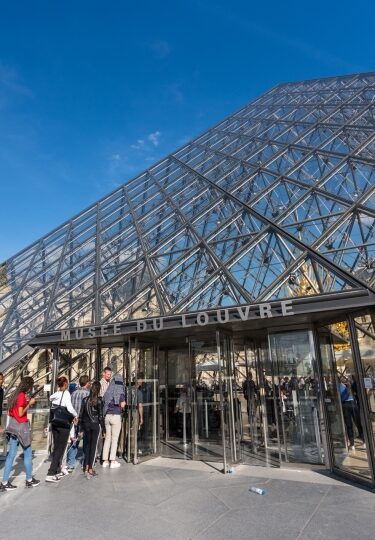What is Paris famous for? Take your pick. The French capital is home to the Eiffel Tower and the world’s largest museum in the Louvre. Exquisite palaces line the Seine, which curves gracefully through the city center.
Leafy parks, grand boulevards, magnificent cathedrals, and, of course, the world’s most glamorous fashion scene all add to the enduring appeal of this most romantic of cities.
Then there’s one of Europe’s most imaginative food cultures based primarily on France’s ineffable culinary traditions, whether you’re looking for a classic neighborhood bistro or a galaxy of Michelin stars.
These are some of the things Paris is most famous for.
Famous Monuments
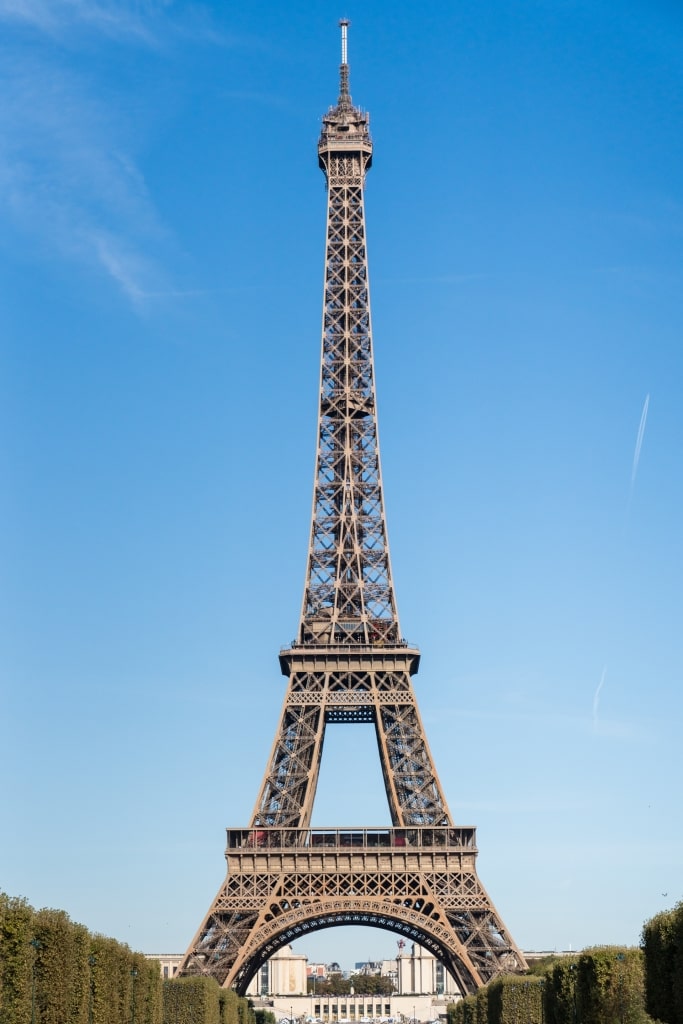
Eiffel Tower
Paris is known for its gorgeous, imposing monuments. These iconic structures, often an exemplar of a particular era in architecture, are one of the city’s instantly recognizable elements.
The preeminent of Paris’s landmarks is the Eiffel Tower. This skyscraping wrought-iron needle became the world’s tallest building when it was unveiled at the 1889 Paris World’s Fair. Today, its summit remains the City of Light’s highest point.
Ascend to the top of the tower, feel the breeze, and explore Gustave Eiffel’s wood-paneled office-eyrie. Then revive yourself with a chilled glass of Veuve Clicquot at what must be a contender for the world’s highest Champagne Bar.
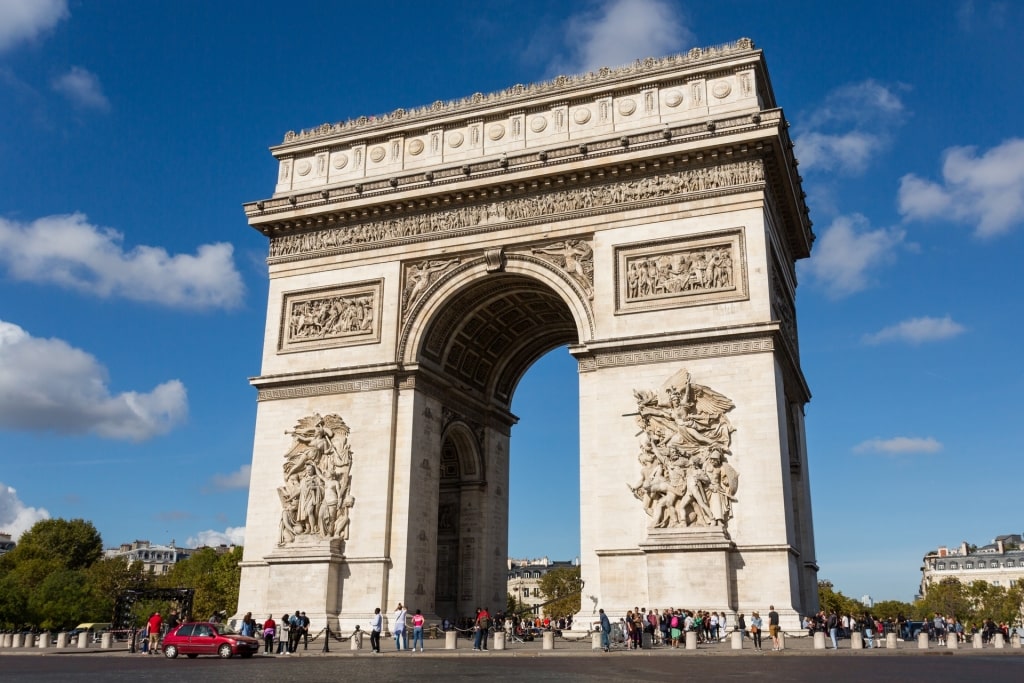
Arc de Triomphe
What’s more celebratory than a flute of effervescent Champagne? The answer: a triumphal arch. Offering yet another superlative to Paris’s account, the Arc de Triomphe is the world’s largest triumphal arch. Modeled on Rome’s Arch of Titus, the French arch was created to commemorate Napoleon’s greatest military success. It took 30 years to complete.
Ascend the 300 steps inside of this epic war memorial to the viewing platform, offering one of the best views in Paris along the Avenue des Champs-Élysées and over the Parisian chimney pots. If you squint, you might make out the Place de la Concorde at the far end of the Champs’ nearly mile-long extent.
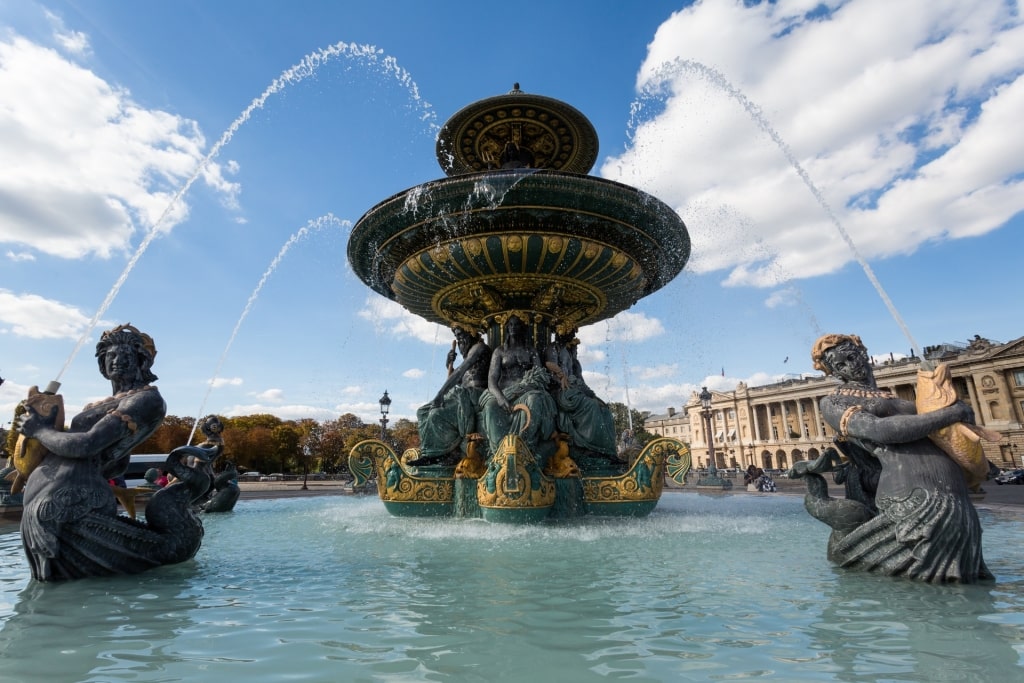
Place de la Concorde
Ask someone “What is Paris known for?” and a few might mention the French Revolution. The Place de la Concorde is a symbolically important site for this tumultuous period towards the end of the 18th century. So much so that the square used to be known as “Place de la Revolution”.
It was here, to a military drumbeat, that the French King Louis XVI was taken to the guillotine on January 21, 1793. With its conciliatory new name, the square today is more like a spacious sculpture park, with an Egyptian obelisk, statues, and ornate fountains to admire.
Shopping

Avenue des Champs-Élysées
Paris is one of the best shopping cities in Europe, if not the world. What elevates it above the other metropolises is a legendary sense of style, a certain je ne sais quoi, and the Avenue des Champs-Élysées.

Avenue des Champs-Élysées
Shaded by centuries-old plane trees, the Champs is a shopping street worthy of the most glamorous city in the world. Beneath its pick-and-mix of colorful awnings and amid its ingenious window displays are all the luxury brands you could ever want, interspersed with flagship stores for big brand names such as Zara or Lacoste.
Across from the George V Metro station on the Champs, any pilgrimage to this heart of French retail must include a peer at the art deco Louis Vuitton Maison—a listed monument.
Arrive on the first Sunday of the month when traffic is banished from the Champs, and you’ll be able to dash from one side to the other without fear of being tooted at by a scooter while in a retail-induced fugue.
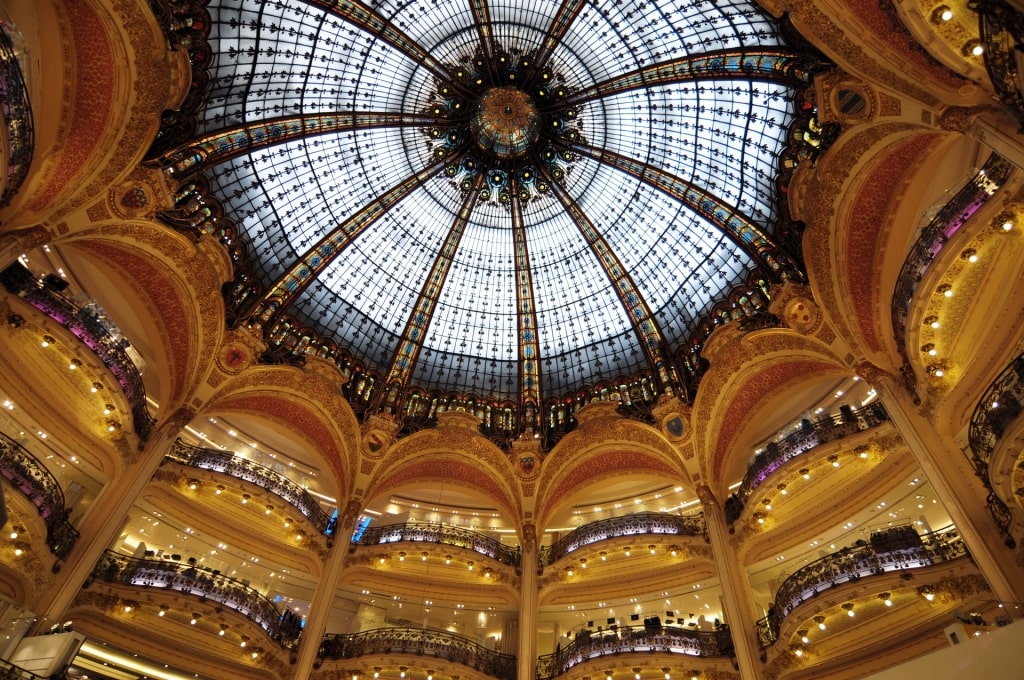
Galeries Lafayette
If the weather isn’t perfect—or even if it is—make a beeline for the Belle Epoque Parisian department stores on Boulevard Haussmann. Glorious Galeries Lafayette offers a huge number of brands beneath its stunning art nouveau dome.
Nearby, you can also burrow into Les Arcades—passageways laid with mosaics and brimming with boutiques. Lively Passage Jouffroy is a short walk along Boulevard Haussman from Galeries Lafayette and features shops such as the Pain d’Epices artisan toyshop, and niche treasures such as Segas, which specializes in antique walking sticks.
The Arts
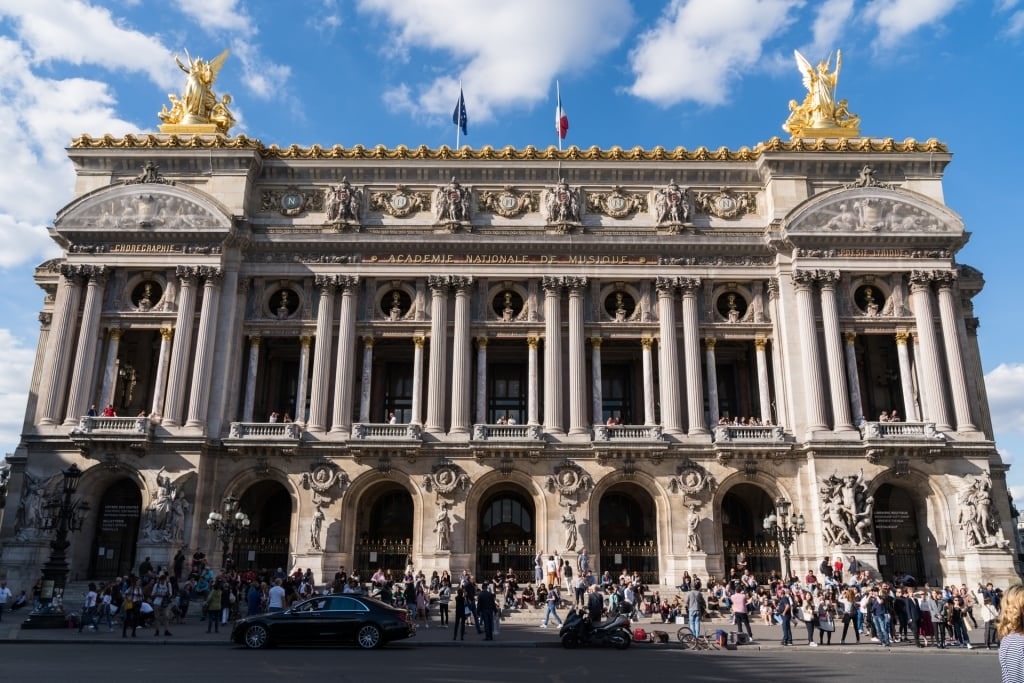
Opera Garnier
Paris is famous for its dedication to the arts. The French state has a strong record on supporting the arts—literary, musical, visual, or otherwise. Its capital has been the crucible for numerous artistic movements including Impressionism, Cubism, and Art Deco.
Today, while there are dozens of arts venues found in the city, there are some that cannot be missed. The 19th-century Opera Garnier is one such place, although to describe it as simply an arts venue seems almost deceptive.
Originally constructed to be the home of the Paris Opera, the Opera Garnier—now officially known as the Palais Garnier—is as much a monument to Belle Epoque architecture as it is a working musical arts venue.
Read: 10 Best Theaters in the World
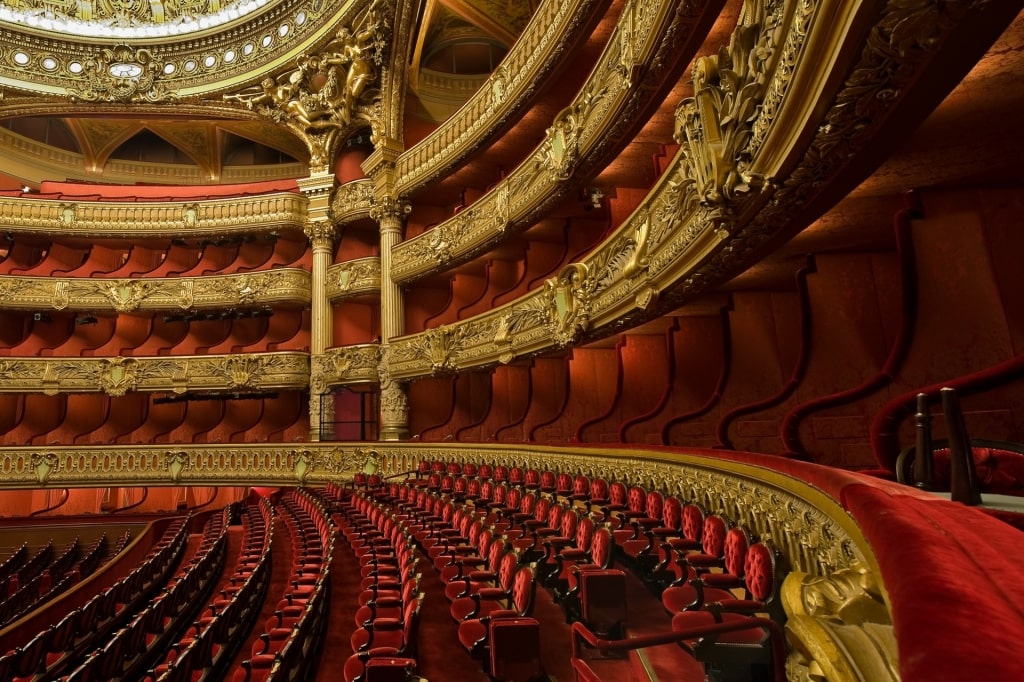
Opera Garnier
Visit and embark on a self-guided tour of the ostentatious Napoleon III-era interior fit for a regal residence. Explore the auditorium, with its Marc Chagall-painted ceiling hovering overhead like a celestial painter’s palette.
If you can tear your eyes away from the Chagall, find Box Five dedicated to Gaston Leroux’s Phantom of the Opera, which is set in this opera house.
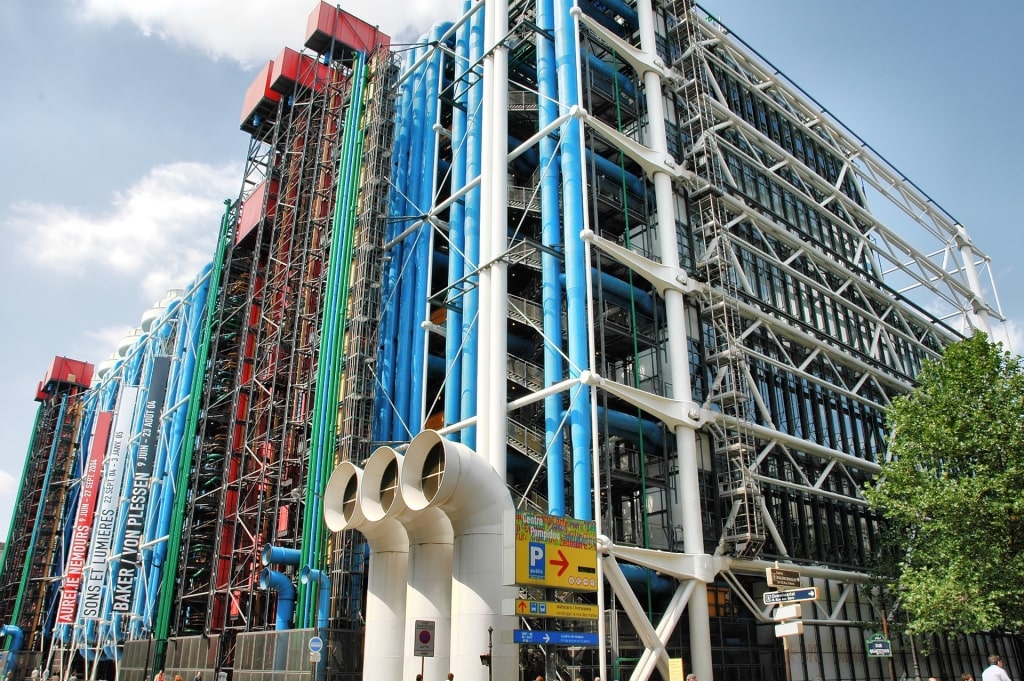
The Centre Pompidou
Now for something completely different. The Centre Pompidou is more than just France’s National Museum of Modern Art—Europe’s largest—stuffed with works by Duchamp, Picasso, and Man Ray.
Within this beloved urban landmark, you’ll also find a cinema, public library, and trendy Le Georges restaurant on the sixth floor with its panoramic terrace.
Even if you decide not to go in, the high-tech architectural exterior is worth a detour. Designed by Renzo Piano, Su Rogers, and Richard Rogers, the Center Pompidou is an island of colorful industrial pipes amid a sea of sober gray mansard roofs.
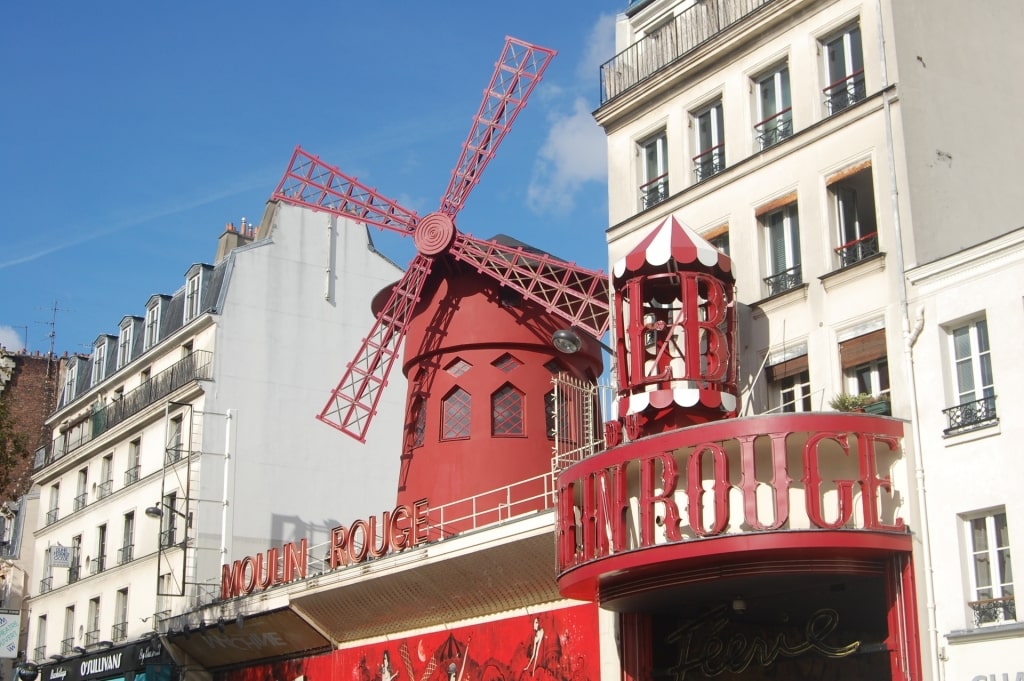
Moulin Rouge
With its origins beneath the windmill of the Moulin Rouge, Cabaret is another art form with an intrinsically Parisian sense of glamor. While the Moulin Rouge lays claim to being the most historical cabaret in Paris, you can also find traditional-style cancan dancing elsewhere—such as at Le Lido on the Champs.
Read: One Day in Paris
Museums
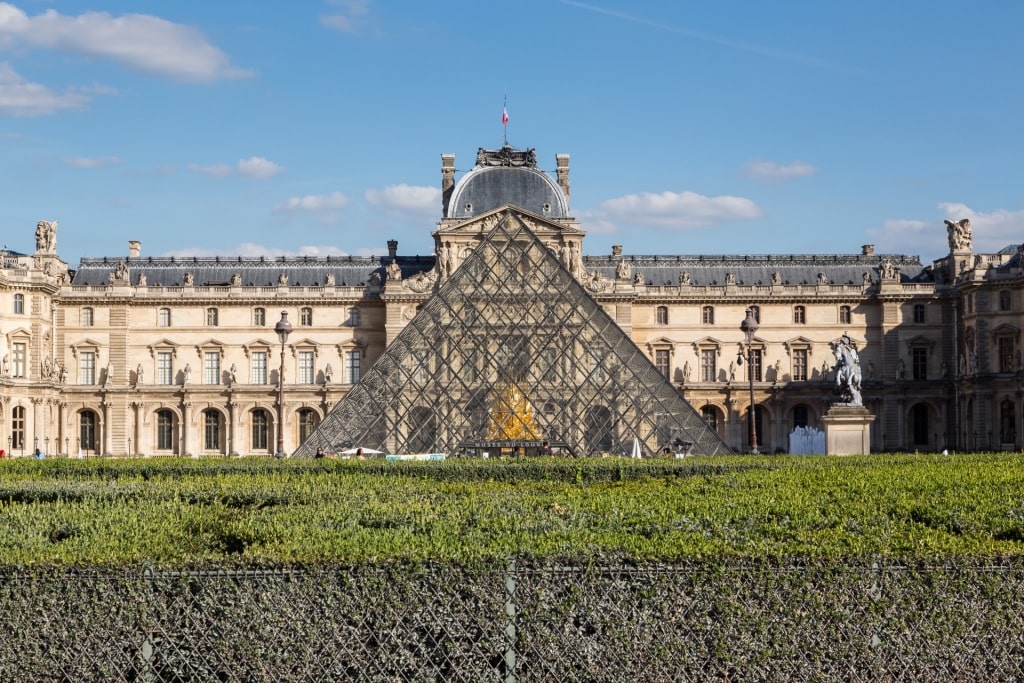
Louvre
When it comes to visiting an art gallery in Paris, it can be difficult to see past the grandeur of the Louvre. One of the world’s best museums, it exhibits 38,000 artifacts and artworks across just over 753,000 square feet (which adds up to a lot of football fields).
And while the world’s largest museum is a quintessentially French brand, this museum is in fact a truly international space.
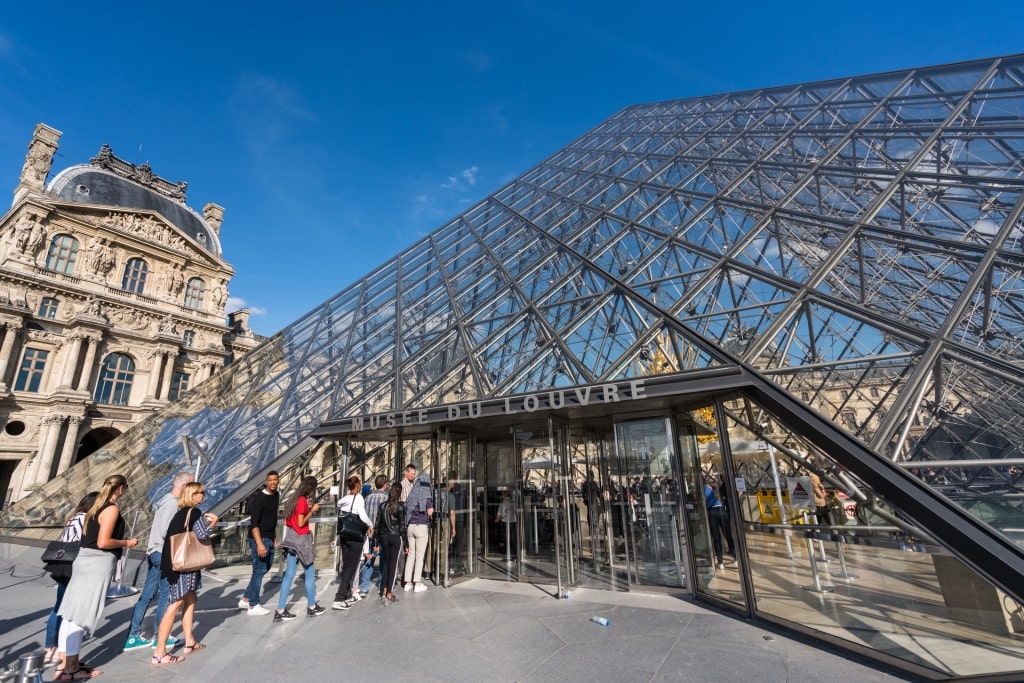
Louvre
Its delicate glass pyramid, which contrasts so wonderfully with the 12th-century Louvre Palace comprising much of the museum’s above-ground architecture, was designed by the Chinese-American architect I. M. Pei. Its eclectic collection includes sculptures from Mesopotamia, medieval Iranian tiles, and, of course, portraiture from Italy.
Beat the mobbing of the Mona Lisa by visiting on an evening (Wednesdays and Fridays until 9:30 pm), when it’s quieter. Alternatively, if ambiguous smiles aren’t essential to your itinerary, use your time to experience one of the city’s other art galleries such as the Musée d’Orsay.

Musée d’Orsay
Set spectacularly Seine-side, the stately Musée d’Orsay holds within its Beaux-Arts corridors the world’s largest collection of Impressionist art. The Impressionist movement is an intrinsic part of the city’s cultural history with artists such as Monet, Renoir, and Van Gogh all living in (or near) Paris at some point towards the end of the 19th century.
And while you stand mesmerized by the shimmer of light in Renoir’s “Dance at Le Moulin de la Galette” or the potential sale price of Cézanne’s “The Card Players”, you’ll inevitably grow curious about the impressive dimensions of the Musée d’Orsay.
Originally the Gare d’Orsay, the museum was constructed as a railway station for the Paris Universal Exhibition of 1900. Its short platforms soon rendered it obsolete and this architectural treasure was converted into a museum in 1977.

Grand Palais des Champs-Élysées
Another outsized museum that’s lived other lives is the Grand Palais des Champs-Élysées. Today, this immense configuration of glass, iron, and stone contains a science museum and the blockbuster exhibitions of the National Galleries.
In its past, however, the view down through the web of steel and glass that is the Grand Palais’ ceiling would have revealed crowds exploring exhibits at the Universal Exhibition of 1900 (for which the Grand Palais was built); the rows of beds of a WW1 military hospital; and the busy headquarters of the French Resistance during WW2.
Holy Sites
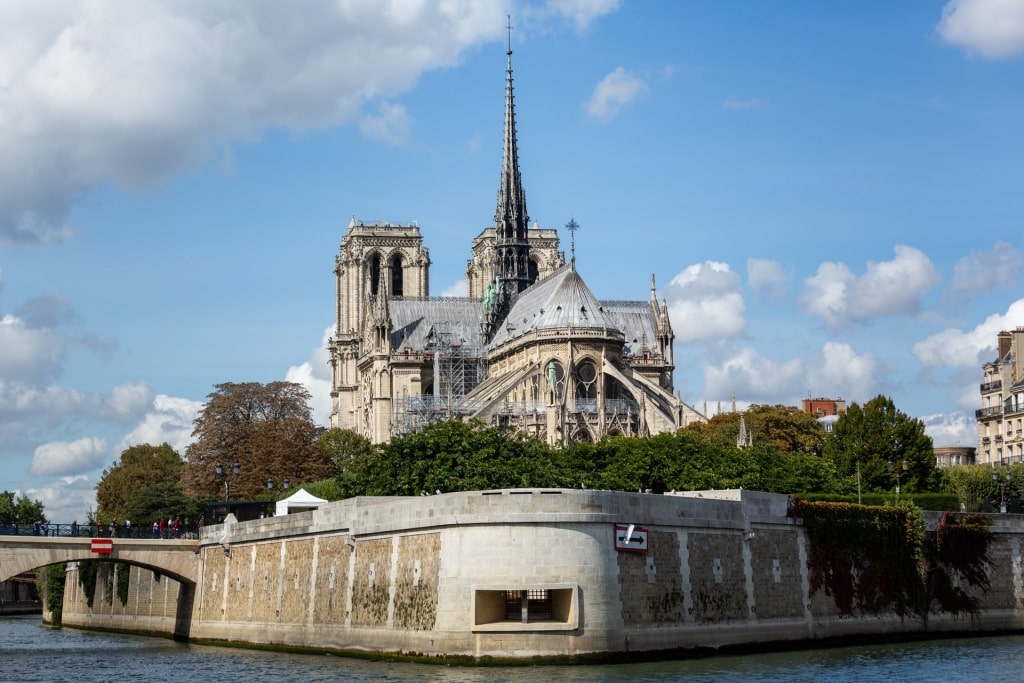
Notre-Dame Cathedral
While Paris for many is the city of intellectualism, chic style, and world-class cuisine, the fact remains that at its historical heart, on a slip of land in the Seine, is Notre-Dame Cathedral.
The French revere its twin French Gothic towers as much as the Arc de Triomphe or Bordeaux wine. Through its long history, the 12th-century Catholic cathedral has endured fires, angry mobs, and more.
Despite this, the interior remains a bastion of serenity, the light filtering inside tinted by the cathedral’s trio of stained-glass rose windows. Following a catastrophic fire in April 2019, the cathedral is still being restored to its former glory.

Basilica of the Sacré-Coeur
From Notre Dame’s central 4th arrondissement to the 18th, where from Montmartre’s Square Louise Michel loom the shining Roman-Byzantine domes of the Basilica of the Sacré-Coeur.
Climbing the many steps up to the basilica definitely earns you a Nutella crêpe from one of the stalls that fill Montmartre’s cobbled lanes with the tempting aroma of cooking batter.
The second-highest point in Paris after the Eiffel Tower, Sacré-Coeur’s eye-catching domes were inspired by St. Mark’s Basilica in Venice. It’s France’s second most visited religious monument after Notre Dame and its flying buttresses.
Pilgrims visiting the interior will be treated to the sight of over 5,166 square feet of religious mosaic—the country’s largest.
The Seine
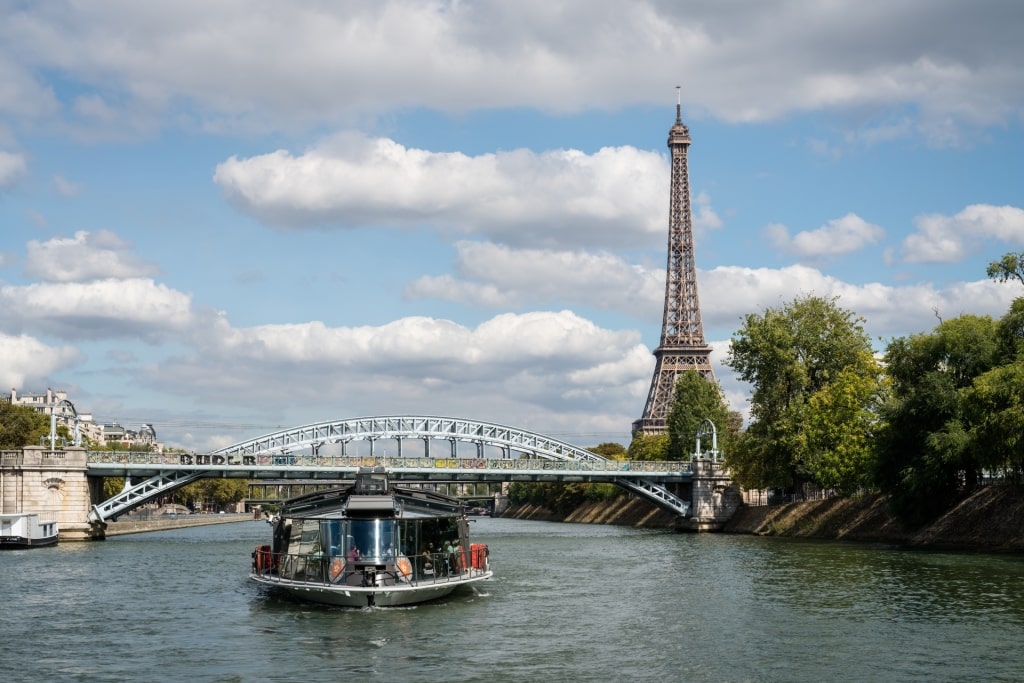
Seine
While there’s no missing the Seine—the broad river slipping silver-blue below street level and dividing Paris into two distinct halves—it is often overlooked as a way of exploring the city.
Of course, you’ll cross its many bridges numerous times on your travels to see various monuments, museums, and the Moulin Rouge. While doing so, the river may distract you from your timings, lure you into a contemplative stroll on the comfortably wide walkways that line its banks.
This UNESCO stretch of river offers an escape for Parisians, like a kind of linear park that’s mostly water feature. It’s a cool refuge in high summer and a place to encounter book-sellers and artists dabbing at their canvasses.
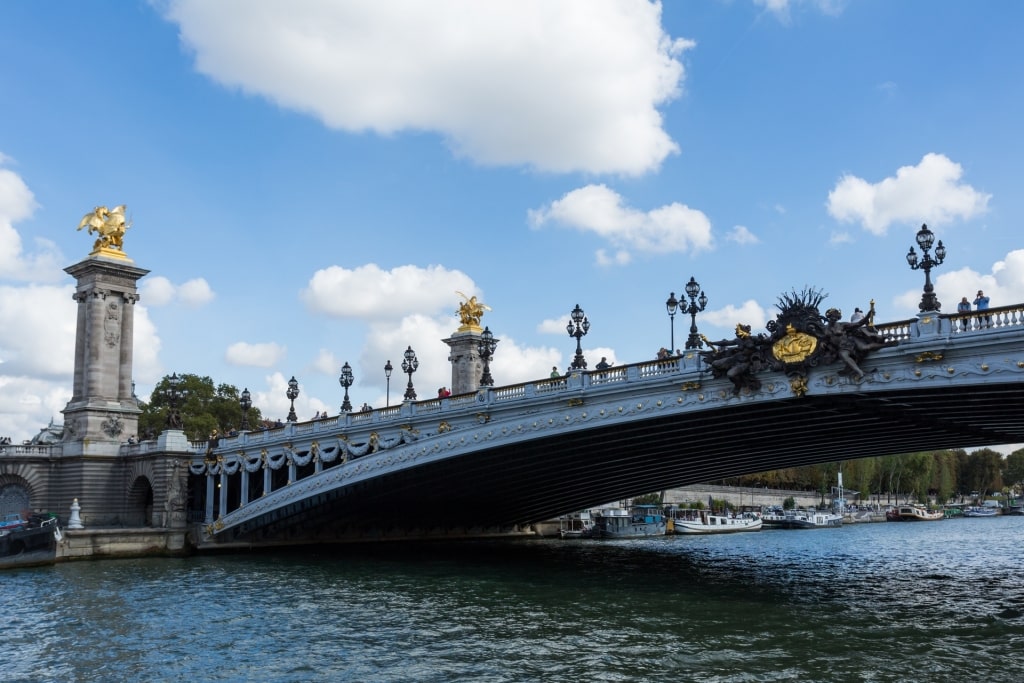
Pont Alexandre III
Sometimes you’ll find the bridges are a destination in themselves. The Pont Alexandre III is one such structure. Connecting the Grand Palais with the Invalides complex, its practical purpose is fleshed out with added winged horses, cherubs, and gilded nymphs. Unsurprisingly, this diva of Parisian bridges has swanned into countless movie backdrops.
More understated is the elegant Pont Neuf (its name “the new bridge” grown ironic with its longevity). The oldest of the 37 bridges currently straddling the Seine, it’s connected the Île de la Cité with the rest of Paris’s historical center since 1607. To walk its span to reach Notre Dame is to follow in the footsteps of the medieval Parisians.
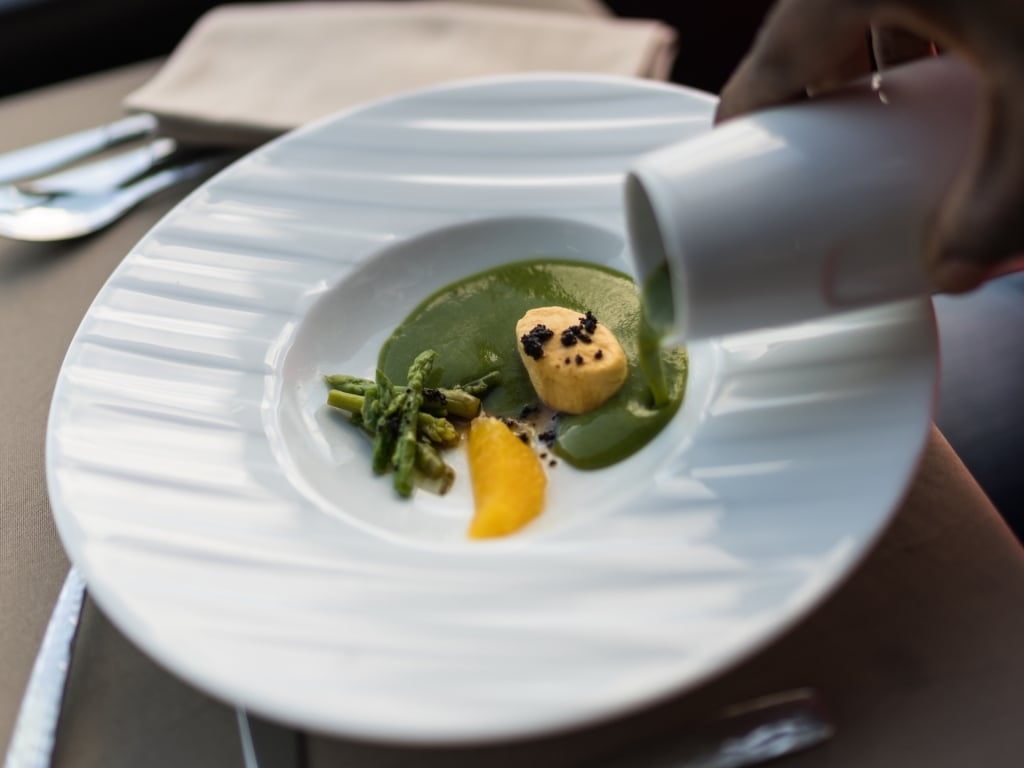
River cruise
However, given the chance, those medieval Parisians would have probably preferred a river cruise with a three-course dinner. Take your seat for a feast of French fare, paired with wine, and just go with the flow.
You’ll pass, among other French landmarks, the Louvre, the Musée d’Orsay, and Notre-Dame from a perspective uncommon to most visitors to the city.
Cuisine
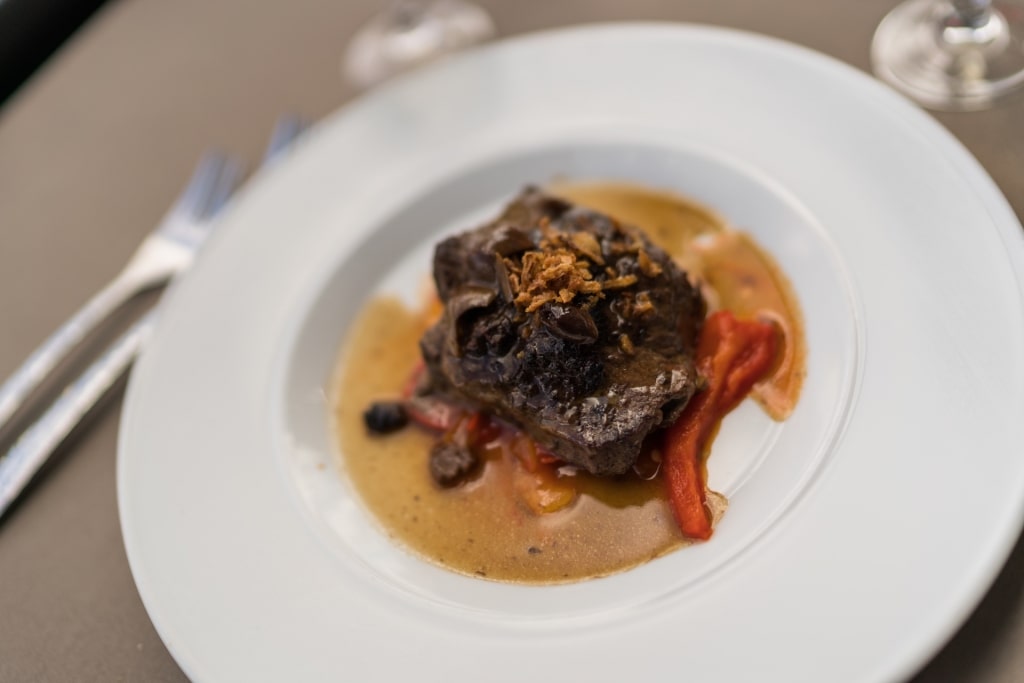
French cuisine
When it comes to gastronomy, it’s fair to say that it’s a national obsession. That the French have elevated their sauces, pastries, and frogs’ legs to another level has been officially recognized by UNESCO in 2010 when it made French dinnertime an Intangible Cultural Heritage.

Alléno Paris au Pavillon Ledoyen Photo by Guilhem Vellut on Wikimedia Commons, licensed under CC BY 2.0
Of course, with Paris being the capital, this is where the talent concentrates. That’s reflected in a galaxy of Michelin-starred, haute cuisine restaurants waiting to be explored across the arrondissements.
Several of these have three Michelin stars, offering rarified elegance and mesmerizing taste experiments such as those found in the Alléno Paris au Pavillon Ledoyen.
The thing about Paris is that you’ll find that even a neighborhood bistro offers flavor experiences that are just unmatched anywhere else in the world. Stop into Table in the 12th arrondissement to dine on whatever food writer and chef Bruno Verjus has had delivered that day, from juicy, truffle-gilded scallops to something called a black turnip.

Wine
All these imaginative platefuls are elevated by some of the world’s finest wines. The best of France’s 11 major wine regions are whittled down to a concentrated selection offering the finest glasses of Bordeaux, Burgundy, or Champagne for the demanding palates of the citizenry.
It helps that there truly are no culinary dead zones in the city. The Champs, as you’d expect, offers something a little special such as Alain Ducasse au Plaza Athénée. Look out for Chinese-French fusion at yam’Tcha near the Louvre and Palais-Royal, or dive into modern French delights at the profusion of restaurants in Bastille.
And don’t forget to save room for dessert. That’s what Paris is really famous for, after all.
Read: Best Things to Do in Paris With Kids
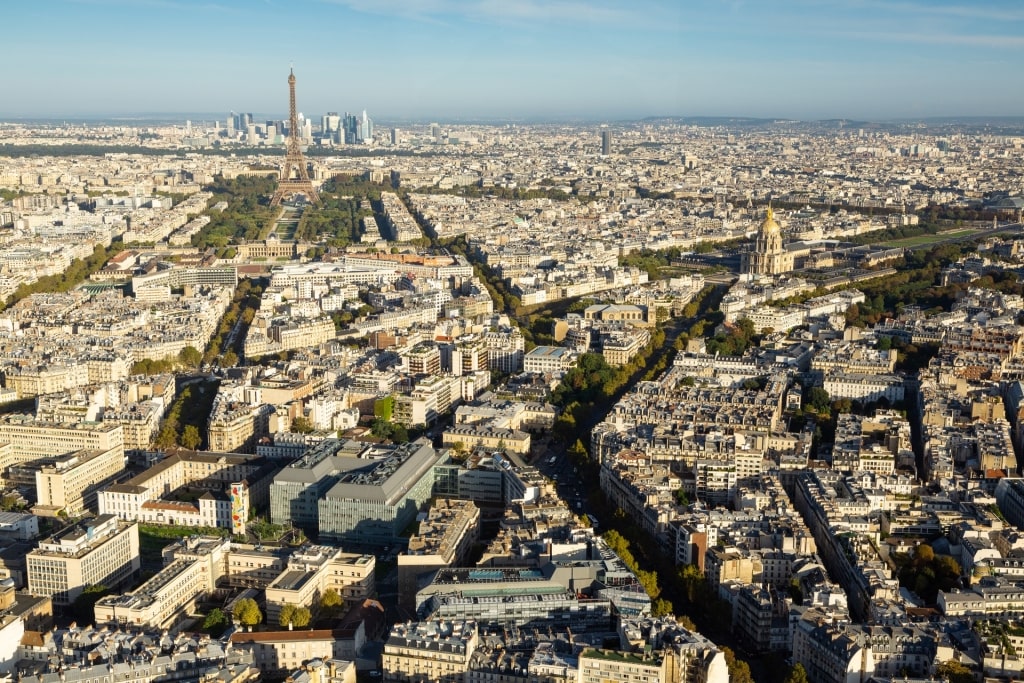
Paris
From the treasures of the Louvre to the bistros of Montmartre, Paris is one of the world’s most alluring cities. Browse our cruises to Paris online and book an incredible vacation to France.
